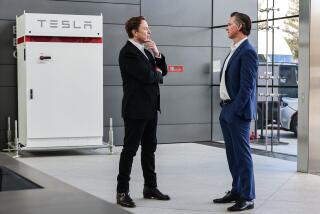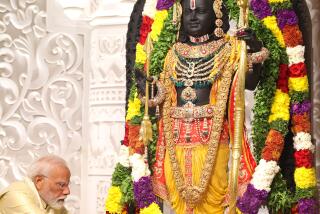California’s tech ties to India are about to get a boost
He’s a vegetarian, practices yoga and tweets selfies.
Narendra Modi is so California.
But the Indian prime minister is looking for more than superficial connections when he visits Silicon Valley this month in the first trip by an Indian leader to California in more than three decades.
In a two-day swing, Modi hopes to enjoy the warm embrace of a U.S. high-tech industry that already has strong connections with India and a thriving diaspora community that generally embraces his swaggering style.
The California trip will come on the heels of an address to the United Nations General Assembly in New York.
Facebook founder Mark Zuckerberg announced Sunday that he would host Modi for a town hall-style event at the company’s Menlo Park, Calif., headquarters to “discuss how communities can work together to address social and economic challenges.” Zuckerberg invited Facebook users to post questions, generating more than 22,000 comments in less than 12 hours.
The California-India connection is important to Modi as he tries to drum up more investment in his country, which currently posts the sharpest growth rates of any major economy. As China and other emerging markets slump, Modi, who took office 16 months ago, is seeking to position India as a new hub for manufacturing and the digital industry, vowing to sweep away bureaucratic spiderwebs that have long disheartened foreign investors.
SIGN UP for the free California Inc. business newsletter >>
The visit also marks the 64-year-old Modi’s ongoing effort to rewrite his relationship with the U.S., which once barred him from the country over concerns about his human rights record. To court Silicon Valley, Modi is not only relying on the region’s existing ties with Mumbai and Bangalore – India’s financial center and high-tech hub, respectively – but also appealing directly to Indian immigrants who are generally supportive of his optimistic, pro-business message.
Few world leaders could pack even one major U.S. sports arena, as Modi did in a speech at Madison Square Garden last year, but he’s expected to do so again Sept. 27 in San Jose. An Indian American group organizing a “community reception” for Modi at the 19,000-seat SAP Center says that more than 45,000 people have sought free tickets.
Modi is also expected to meet with other tech companies including Adobe Systems Inc., whose Chief Executive Shantanu Narayen was born in India, and attend events with Indian American entrepreneurs and social investors. Nearly 3 million people of Indian origin live in the U.S., according to estimates.
For Modi, “it’s a very well thought effort to capitalize on the connection he has with the diaspora and involve them at a point in time when India is perceived to be on a positive track in terms of governance,” said Subimal Bhattacharjee, a cyberspace policy analyst and former India head of General Dynamics, the U.S. defense contractor.
India already has a deep bench of high-tech workers who run the back-office systems of many U.S. tech companies. Modi aides said he is also due to visit the electric car maker Tesla’s facilities in Palo Alto to highlight his plans to develop clean energy.
Analysts say the greater potential for India’s economy – and U.S. investment – is in software innovation.
“We are seeing more and more companies in India become product companies rather than services companies,” said Ajay Chopra, general partner at Trinity Ventures, a venture capital group in Menlo Park.
Silicon Valley money has followed. The Indian restaurant-finder app Zomato, backed by Menlo Park-based Sequoia Capital, recently bought the restaurant review site Urbanspoon for about $60 million in one of the largest-ever U.S. acquisitions by an Indian start-up.
Nitin Pai, co-founder of the Takshashila Foundation, an independent think tank in Bangalore, said that so much of the city’s tech economy is tied to the American West Coast that “when it’s a public holiday in the U.S., you can feel the traffic here is lighter.”
Modi’s challenge is to turn those shared connections into a driver of economic development. He has launched an ambitious series of initiatives called “Digital India,” which aims to expand Internet access, boost electronics manufacturing and develop apps to improve the delivery of government services.
Of India’s 1.25 billion people, about 10% have decent Internet connections, while 40% have only basic connectivity. While U.S. technology hardware companies like Cisco Systems Inc. maintain back offices in India, few have manufacturing plants here – something Modi wants to change in order to create jobs for the 1 million young Indians who enter the work force each month.
Modi pushed his open-for-business message when he hosted President Obama in New Delhi in January, and his government has lifted some limitations on foreign investment.
But when India’s finance minister, Arun Jaitley, visited the U.S. in June, he heard longstanding complaints about his country’s thorny tax codes regime, volatile court system and often shoddy infrastructure. After scaring overseas investors by saying it would seek to collect billions in retroactive capital gains taxes, the government backed off the plan earlier this month.
”They haven’t done anything to impress people here that they are serious about the reforms,” said Kanwal Rekhi, a pioneer among Indian immigrant entrepreneurs in the U.S. in the early 1990s. “There’s a more welcoming tone, but there’s no substance yet.
“They should have the red carpet rolled out [for U.S. businesses], which I don’t see. We want to hear, ‘Here’s the set of rules we want you to play under,’ rather than this random set of rules coming from left field and right field.”
Last month, scores of U.S. university professors urged Silicon Valley executives to exercise caution in dealing with Modi because of accusations in India that he is pursuing an agenda biased in favor of the Hindu majority. Before he became prime minister, the U.S. denied him a visa for nearly a decade over allegations that he did not intervene to stop religious riots that killed at least 1,000 people, mainly minority Muslims, while he was chief executive of Gujarat state in 2002.
Experts say that after much talk of renewing the relationship, Modi “has to be much more specific and clear” about what India offers to U.S. companies, said Homa Bahrami, senior lecturer at UC Berkeley’s Haas School of Business.
“In the last 10-15 years, there has been a huge amount of investment in India, and today we have a critical mass of Indian entrepreneurs in Silicon Valley and indigenous tech companies in India,” Bahrami said. “I would say that’s a great foundation one can build upon.”
Bengali reported from Mumbai and Dave from Los Angeles.
ALSO
Fifteen remain missing in Japan flooding
Indian court convicts 12 in 2006 Mumbai train blasts
104 killed, 100 injured in explosion near central India bus stop
More to Read
Start your day right
Sign up for Essential California for news, features and recommendations from the L.A. Times and beyond in your inbox six days a week.
You may occasionally receive promotional content from the Los Angeles Times.








